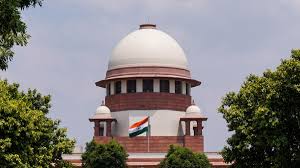NEW DELHI: The Supreme Court on Thursday ruled that timelines cannot be fixed for the grant of assent to Bills by the Governor and the President under Articles 200 and 201 respectively.
In a unanimous verdict, a five-judge Constitution Bench led by Chief Justice of India BR Gavai said that the concept of “deemed assent” was against the spirit of the Constitution and the doctrine of separation of powers.
Noting that Articles 200 and 201 were framed to allow elasticity, the Bench — which also included Justice Surya Kant, Justice Vikram Nath, Justice PS Narasimha and Justice AS Chandurkar – said the imposition of a timeline was strictly contrary to it.
“The concept of deemed assent presupposes that constitutional authority would place a substitute role for the role of the governor- its antithetical to the separation of powers. We have no hesitation in concluding that deemed assent is virtually a takeover of functions of a constitutional authority,” CJI Gavai said, pronouncing the verdict.
The Bench held that powers of the Governor and the President can’t be substituted using Article 142 of the Constitution.
Noting that there’s no question of deemed assent, the Bench said assent of the Governor can’t be supplanted by the Supreme Court.
Noting that the Governor has three constitutional options – to grant assent, to reserve for the President or to withhold and return the Bill to Assembly, the Bench said if the Governor was withholding assent to the Bill, then it must be necessarily returned to the State Legislature.
Emphasising that there’s a bar on judicial review on Governor’s/President’s powers under Articles 200/201, the Bench said in case of prolonged, unexplained, or indefinite delay, the constitutional court can issue limited directions.
The decision of the President and the Governor was not justiciable at the stage of Bill, it said.
The Bench clarified that the President cannot seek the Supreme Court’s advice under Article 143 every time the Governor reserves a Bill for the President.
The Supreme Court’s opinion on a Reference under Article 143 is not binding on the President and it’s not a binding law within the meaning of Article 141. It’s open to the top court to answer the reference or not. However, in case it does not want to answer the Reference, the court has to give reasons.
After the pronouncement, the CJI thanked all the senior lawyers for their able assistance during the hearing.
Solicitor General Tushar Mehta thanked the Constitution Bench on behalf of President Droupadi Murmu who had on August 19 sent 14 contentious constitutional questions through a Presidential Reference under Article 143 of the Constitution to the top court over its recent judgment imposing timelines for governors and the President to grant assent to Bills passed by state legislatures.
The Centre had urged the Constitution Bench to declare that the April 8 verdict of a two-judge Bench in Tamil Nadu’s case did not lay down the correct law.
The top court had on April 8 set aside Tamil Nadu Governor RN Ravi’s decision to withhold assent for 10 Bills and reserving them to the President even after they were re-enacted by the state assembly, terming it “illegal and erroneous”.
Invoking Article 143 of the Constitution, President Murmu had in May sought the Supreme Court’s opinion on 14 questions arising out of the verdict fixing deadlines for Governors and the President to take a call on Bills passed by state Assemblies.
The Bench had commenced hearing on the Presidential Reference on August 19. After 10 days of marathon arguments by Attorney General R Venkataramani and Solicitor General Tushar Mehta for the Centre and senior advocates Kapil Sibal, Gopal Subramanium, Arvind P Datar, Gopal Sankaranarayanan and others for various state governments, the Bench had on September 11 reserved its verdict.


